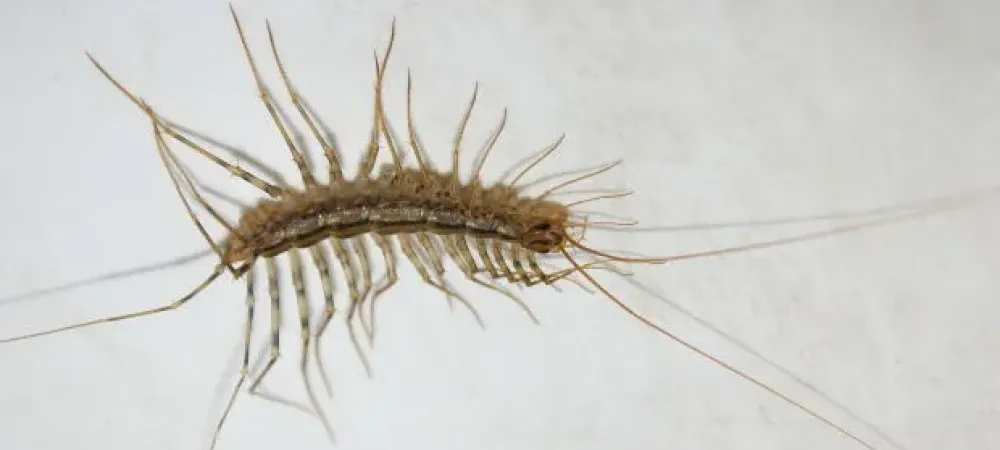Centipedes vs Millipedes: What's in Your Basement?

Two of the most common seasonal invaders are centipedes and millipedes. At first glance, they may look similar, but knowing the difference is key to addressing the issue. Centipedes are fast predators that may bite, while millipedes are slow-moving scavengers that curl up when disturbed. Both should be taken as a sign to address basement moisture and entry points.
Table of Contents
- What’s the Difference Between Centipedes and Millipedes?
- How to Get Rid of Centipedes and Millipedes in Your Basement
- Prevention Tips for Centipedes and Millipedes
- Common FAQs
- When to Call a Pest Control Professional
What’s the Difference Between Centipedes and Millipedes?
Centipedes (pictured to the left) are predators that feed on other insects. They move quickly and may startle you as they dart across walls or floors. In rare cases, they can bite, but they’re generally more of a nuisance than a danger.
On the other hand, millipedes (pictured to the right) feed on decaying organic material. They’re slow-moving and will often curl into a tight coil when touched. While they don’t bite or sting, they can release a mild odor if handled.
Both pests are attracted to damp, dark environments like basements, especially during winter when outdoor conditions are harsh.
How to Get Rid of Centipedes and Millipedes in Your Basement
If you’re seeing centipedes or millipedes, it’s time to take action to make your basement less inviting:
- Reduce Moisture Levels: Run a dehumidifier to keep humidity low, and repair any leaks or water intrusion.
- Seal Cracks and Gaps: Inspect your basement for small openings around windows, doors, and the foundation, and seal them with caulk or weatherstripping.
- Clear Out Hiding Spots: Remove clutter like cardboard boxes and stacks of paper where pests can hide and thrive.
- Inspect for Additional Pest Activity: Centipedes feed on other insects, so their presence could signal a larger pest problem in your home.
- Contact a Pest Control Professional if Needed: If you notice recurring infestations, professional treatment may be the most effective way to eliminate them and prevent future issues.
Prevention Tips for Centipedes and Millipedes
A few simple steps can make a big difference in keeping millipedes and centipedes out, especially during the colder months when they’re seeking shelter. Here's how you can be proactive in preventing these pests:
- Install door sweeps to block entry points.
- Consistently check for cracks and gaps around your home.
- Store firewood and mulch away from your home’s foundation.
- Keep your home neat and tidy.
- Keep humidity below 50%.
- Invest in a recurring pest management plan
Frequently Asked Questions
Q: Are centipedes in my basement dangerous?
A: Most house centipedes aren’t dangerous, but they can bite if handled.
Q: Why do millipedes curl up when touched?
A: This is a defense mechanism—they’re not aggressive and pose no threat.
Q: What attracts these pests to my basement?
A: High moisture, darkness, and access to food sources like other bugs or decaying matter.
Q: Will centipedes help by eating other pests?
A: Yes, they’re predators, but their presence often means other insects are in your home too.
Q: Do centipedes mean I have other pests?
A: Sometimes. Since centipedes feed on insects, their presence often indicates a food source nearby. For clarity, have a professional check for signs of any other pests as well.
When to Call a Pest Control Professional
Seeing one or two centipedes or millipedes in your basement might not seem like a big deal, but recurring sightings often point to a bigger issue. A professional can help identify and address the root cause, whether it’s hidden entry points, excessive moisture, or an underlying pest problem attracting centipedes as predators.
If you’re unsure whether you’re dealing with centipedes, millipedes, or another type of pest entirely, contact Suburban Pest Control for an assessment. Ready for a solution to your centipede and millipede issues? Our exterminators have the tools and expertise to eliminate the problem quickly and recommend long-term solutions.
